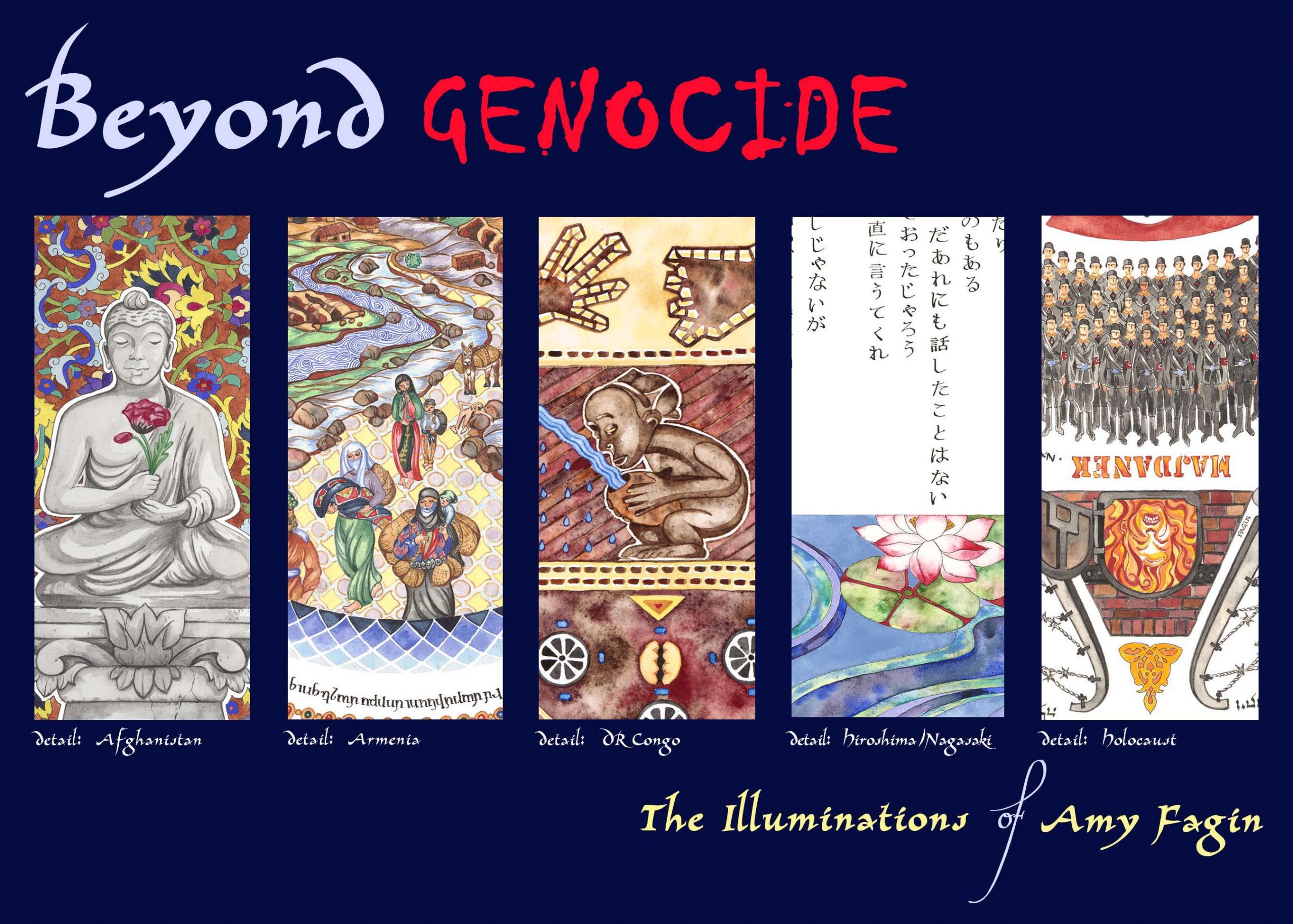These workshop selections are examples of styles of workshops available, and can be customized for subject matter as 1.5 hour to full day sessions with the artist. Workshops are designed for interactive group dialogue for up to 40 participants. Each workshop can also be presented for a larger auditorium style lecture. Workshop examples are divided into 5 sessions and can be taught independently or together depending on the requirements of the host institution.
Session 1. Chronology and Geography of Genocide
This session is designed as an interactive PowerPoint presentation surveying the chronological development of mass atrocity / genocide crimes around the globe. The origin and basic concept of the term “genocide” and the critical judicial proceedings which have led to the development of the International Criminal Court are briefly introduced. Case studies of genocide from antiquity to modernity are presented with an interactive group reading exercise. Current locations of risk prone areas where mass violence is emerging are also outlined.
Session 2: Prevention through Education.
This discussion based workshop introduces the importance of understanding genocide as a personal exercise. Defining groups and members of the group are introduced and subject for discussion. The concept of crimes against humanity as a legal term is introduced, as well as typologies of genocide and are considered by the group. The 10 stage theory of genocide is outlined for understanding and discussion.
Session 3. Thinking Through Art: Beyond Genocide; Community Conversations Global Perspectives
This session is organized into discussion groups for interpretative art analysis. A presentation will be designed by assigned groups based on personal observations, interpretations and group discussion about the composition, details and possible meaning portrayed in selected illuminations from “Beyond Genocide”. Considerations regarding narratives of history and the “truths” that they represent are contextualized with opinions and observations offered for discussion.
Session 4: Memory, Mass Atrocity and Memorialization
This session will explore conceptual challenges and practical issues that occur in the aftermath of mass violence. An introduction to the concept of collective memory and “curating difficult knowledge” will be presented. We will discuss socio/economic and psychological / educational issues that may be present in societies where mass trauma has been experienced. We will work in groups to discuss how memory and collective healing can be fostered, and the challenges of victimhood, power, reconciliation, history, justice and expansion of memory into a global context. We explore and evaluate specific case studies through problem solving, where patterns may be evident.
Session 5: Introduction to the International Criminal Court (ICC)
This workshop will familiarize the group with the background and origins of the international tribunals proposed during the 1919 Paris Peace Conference, through the ad hoc trials for the war crimes of WWII. The international ad hoc courts of the Former Yugoslavia, Rwanda and East Timor and the establishment of the ICC , its history of its operations and trials will establish the precedents for the globalization of international crimes of genocide or crimes against humanity.
Session 6: Introduction to Transitional Justice Processes: Hybrid and Domestic Trials
This session will review with group discussion the concept and history of Transitional Justice and its objectives of establishing truth, providing victims a public platform, holding perpetrators accountable, strengthening the rule of law, victims’ reparations, compensation and reconciliation measures. Current hybrid trials for international violent crimes against groups will be presented for group evaluation. International Institutions facilitating transitional justice processes will be outlined, and a brief overview and comparison of domestic trials of international crimes of genocide or crimes against humanity will also be presented and evaluated by the group.
Session 7: Genocide: Detection, Deterrence and Prevention
What tools and models are available to policy makers, government and civic organizations seeking to predict and respond the genocide or the risk of genocide or other human rights violations of groups? The challenges of information gathering, assessing risk levels of occurrence or re-occurrence are chief challenges in current high risk situations. We will look at various early warning detection tools and discuss NGO prevention groups that advise on current risk regions. The challenges of deterrence are introduced with facilitated problem solving exercises. Prevention tools by various organizations will be explored as well as arts initiatives world-wide dedicated to prevention through education.
Session 8. Technical Workshop for Artists: Introduction to Manuscript Illumination
This session is organized as a 4 hour hands on professional workshop which introduces students to the technical aspects of creating an illuminated manuscript. An historical overview of manuscript illumination followed by a detailed practicum of the methods of creating an original illumination including using ornament in a composition; calligraphy techniques; gold leaf application and various drafting methods provide an excellent introduction for art students who intend to become professional artists.
Session 9. Mandala for Peace Painting (for young audiences only)
This session invites groups of 2 to 4 participants to paint with markers a “color your own” mandala (20 x 20). Mandala making workshops are suitable for younger audiences. A brief history of mandala making is introduced, and students are instructed to work in groups of four to complete an outlined mandala as a tribute to genocide victims worldwide.
Amy will be available for credit based online instruction at host institutions who offer degree programs in Holocaust and Genocide Studies and Prevention in the fall of 2020. Courses that will be available for instruction include: An Introduction to Genocide Studies; Art, Genocide and the 21st Century; Genocide: Cultural Expression, Memory and Memorialization
[wc_button type=”primary” url=”https://beyondgenocide.net/contact” title=”Go to Contact Form” target=”self” position=”float”]Contact Us to Book a Workshop[/wc_button]
